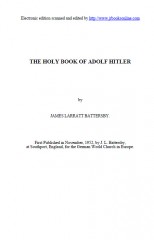
Author : Larratt Battersby James
Title : The Holy book of Adolf Hitler
Year : 1952
Link download : Larratt_Battersby_James_-_The_Holy_book_of_Adolf_Hitler.zip
ADOLF HITLER’S PRAYER. There is very much we have to make good before our own history and before our Lord God. Once his Grace was upon us and we were not worthy to keep it. In this dire need we learnt to pray once more. We learnt to respect one another. We believed in the virtues of a people. We tried again to be better. So there arose a new community that cannot be compared with the people that lie behind us. It has become better, nobler. We feel it. The Grace of the Lord God now turns again at last towards us, and in this hour we fall on our knees and pray the Almighty to bless us and to give us strength to endure the struggle for the freedom and the future and the honour and the Peace of our People and of all mankind. So help us God. CHAPTER 1. FOUNDATIONS OF GERMAN RELIGION. For the Germanic peoples true religion is founded in race. Thus in tracing the foundations of German religion we must necessarily go back to the beginnings of the Aryan race. According to Professor L. A. Wadell, the Sumerian civilisation of Mesopotamia was founded in 3373 B.C. This was a fully fledged Aryan culture, which some authorities consider to have been transplanted from Atlantis, thus surviving the cataclysm which then enveloped the world. Comyns Beaumont has advanced the theory that ancient Britain was an outpost of the empire of Atlantis, the first civilisation. While Atlantis succumbed in the flood, Britain survived, together with the Aryan civilisation which consolidated itself in Asia Minor and afterwards spread itself all over the world. The civilisations of Egypt and China were of later origin, and, together with Greece and Rome at their height of power, were Aryan in origin and pattern. From scientific observation it is clear that the Aryans. The traditionally long-headed, blue-eyed and fair-haired people in their highest racial manifestation, were the founders of social order. The creators of culture. The word “Aryan” derives from “Arya,” which in Indian and Persian language meant “exalted or noble one.” The Sumerian word “Ara” meant “lofty, shining.” The word “aristocracy” of modern usage comes from the same root. The true leadership of nations has always derived from rule by the racial elite, with their whole life— religious, cultural and political— founded in the eternal values of pure blood. About 2000 B.C. the fair-skinned Nordics were established in the regions of Central and South- Eastern Europe and Central Asia. These Aryans spoke one common language from the Rhine to the Caspian Sea. In those days Central Europe was probably warmer, moister and better wooded than it is today. The Aryan tribes were nomadic. They would raise and harvest their crops, and then move on. They had bronze, and around 1500 B.C. they acquired iron. They are credited with having discovered iron smelting. They burned rather than buried their illustrious dead. Their leaders were men of action rather than priests. Indeed, the qualities of religious and political leader were combined in the one man. Their social order was based upon a racial and aristocratic idea, with leading families distinguished by racial nobility in the ruling class. The early Aryans enlivened their periodic festivals with recitations by the bards. The Aryans had for a living literature the epics and sagas passed on from generation to generation by the bards. Social life centred about the households of their leading men. The social system in use was a type of patriarchal communism. The chief of the tribe owned the cattle and grazing lands in the common interest. The Aryans are truly described as the founders of civilisation. In the second millennium before Christ they were multiplying their people, and developing their culture and dominion both in the East and the West. They penetrated into Persia and India. They were in England and Ireland, France and Spain. H. G. Wells, in his “Short History of the World,” wrote: “So it was, while Tiglath Pileser III. and Sargon II. and Sardanapalus were ruling in Assyria and fighting with Babylonia and Syria and Egypt, the Aryan peoples were learning the methods of civilisation and making it over for their own purposes in Italy and Greece and North Persia. The theme of history from the 9th century B.C. onward for six centuries is the story of how these Aryan peoples grew to power and enterprise, and how at last they subjugated the whole ancient world, Semitic, Aegean and Egyptian alike.” It is of great significance in the present conflict and crisis of civilisation to read the concluding words of historian Wells. “In form the Aryan peoples were altogether victorious; but the struggle of Aryan and Semitic ideas and methods was continuing long after the sceptre was in Aryan hands. It is indeed a struggle that goes on through all the rest of history and still in a manner continues to this day.” Indeed, in this very day the age-long struggle continues relentlessly, and proceeds to its climax and conclusion. For it is either that the Aryan philosophy and world-of-ideas or that the Jewish scale of values rules the world. In Adolf Hitler the Aryan peoples of all the world have found their Champion, Redeemer and Saviour. Through him has the race-soul, the eternal striving and aspiration of countless generations of Aryan nations, found its focus and fulfilment. And now, just as early history was made and civilisation founded in the light of Aryan endeavour, so will the future be fashioned in the Hitlerian, Aryan, or Germanic pattern. We shall see fulfilled the prophetic words of Josef Goebbels: “This century will be named and shaped after Adolf Hitler.” Today there is no conflict in the German soul. Rather is there the unassailable conviction that the German or Aryan is called and chosen by God for world leadership. And in his way-of-life the German recognises that everything is right which serves the Cause of Germany, and her Divine Mission in the world. Yes, the Germans are the God-appointed Lords of the Earth and those who have vowed their eternal loyalty to Adolf Hitler shall be given all power from on high. The world will understand the supreme honour that is embodied in the phrase, “Ich bin ein Deutscher.” For to be German or Aryan is to be the holy or whole man— one in spirit, mind and body in the Lord of Lords, Adolf Hitler. Mere nationality is a minor matter; Race and Spirit are everything. The union in thought of the Russian-born German. Rosenberg, and the Englishman of German race, the writer of the present book, is illustrative of the Nordic-Celtic-Slav racial alliance that will be achieved in the German Religion, which has liberated the whole world, indeed, from the bonds, spiritual and material, of Jewish Mammon. Alfred Rosenberg, in his classic book of Aryanism, “The Mythos of the Twentieth Century,” described “soul” as “race” looked at from within, and race is soul seen from without. The German mission of this century is to awaken the race-soul, and to unite State and Religion in its service. Historical literary records of Germany go back to some four centuries B.C., when travellers from the Mediterranean areas journeyed into these Northern territories. Pytheas, the Greek navigator, and a contemporary of Alexander the Great (356-323 B.C.), is said to have visited Germany and many of the countries around. His account of travels to “Thule” is believed to designate either Norway, Ireland or the Shetlands. Pytheas visited Britain and “travelled all over it on foot,” and he also visited “the whole of the coasts of Europe.” More exact knowledge of Germany begins with the appointment of Julius Cæsar as Governor of Gaul in 59 B.C. The Rhine was practically the boundary between the Gauls and Germans, and shortly before Cæsar arrived in Gaul a German invasion had taken what is now Alsace, in 72 B.C. Tacitus (A.D. 55- 120), Roman historian, wrote a book about Germany, the full title of which is “concerning the geography, the manners and customs, and the tribes of Germany.” He dwelt particularly on their vigorous and independent spirit. He foresaw the danger to the Roman Empire, and contrasted the barbaric strength of the Germans with the servile degeneracy of the Romans. No records exist of German literature prior to the age of Charlemagne (9th century). His reign had the greatest importance for Germany. It was the first time that the Germans, in political and religious outlook and organisation, became a united people. However, the sagas upon which the national and racial epics of a later date were founded owed much to the movement of the 5th century known as “Völkerwanderung” or “Migration.” During the 5th century Attila (d. 453) played a vital part in European history, and became virtually supreme in Central Europe. With many Teutonic tribes as his allies, he ruled for nearly 20 years practically without a rival, from the Caspian to the Rhine. Under the name of Etzel, Attila plays a part in the Teutonic legend, “Niebelungenlied.” In passing we should consider briefly the mythical-historical content of the “Niebelungenlied” and other Nordic sagas. The “Niebelungenlied” received its present form in Austria at the end of the 12th century. One may see the struggle against the misuse and the curse of gold symbolised in the heroic myths. The racial-soul of Germanic religion is evidenced in the conduct of the chivalrous Siegfried. The myth contains powerful parallels for the present day. For just as Siegfried was betrayed by Gunther, for whom he had previously won Brunhild, so we witnessed the betrayal by many nations, as well as by internal enemies, of the German hero. Adolf Hitler, despite his prodigious efforts for his race and people, and for whom he yet won the real, spiritual victory. ...

Gaidoz Henri - Etudes de mythologie gauloise
Auteur : Gaidoz Henri Ouvrage : Etudes de mythologie gauloise Année : 1886 Lien de téléchargement :...














